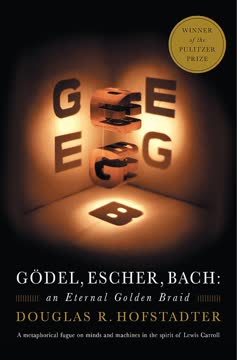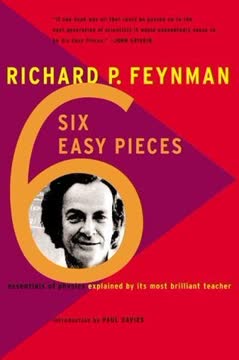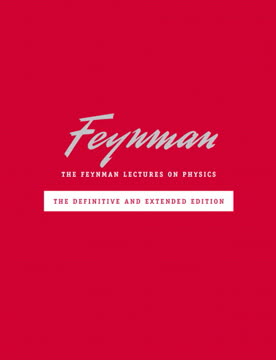نکات کلیدی
1. کنجکاوی علمی با شگفتیهای کودکی آغاز میشود
"پدرم کمی با انرژی سر و کار داشت و از این اصطلاح بعد از اینکه کمی دربارهاش فهمیدم، استفاده میکرد. میدانم که او چه میکرد، زیرا او در واقع تقریباً همان کار را انجام میداد – هرچند مثالش از سگ اسباببازی متفاوت بود. او میگفت: 'این حرکت میکند چون خورشید میتابد'، اگر میخواست همان درس را بدهد."
پرورش کنجکاوی. سفر فاینمن به دنیای علم با رویکرد نوآورانه پدرش در آموزش آغاز شد. به جای اینکه فقط پاسخها را ارائه دهد، پدرش او را تشویق میکرد تا مشاهده کند، سؤال بپرسد و دنیای اطرافش را کشف کند. این مواجهه زودهنگام با تفکر علمی، پایهگذار کارهای آینده فاینمن شد.
یادگیری از طریق کاوش. با کاوش در طبیعت و پرسش درباره پدیدههای روزمره، فاینمن جوان به درک عمیقی از ارتباطات دنیای طبیعی دست یافت. این رویکرد به یادگیری، توانایی او را برای دیدن فراتر از سطح و کشف اصول بنیادی حاکم بر جهان تقویت کرد.
2. تفکر غیرمتعارف به کشفیات انقلابی منجر میشود
"فاینمن در طول حرفهاش، درخشش نظری و شکاکیت بیاحترامی را ترکیب کرده است."
چالش با کنوانسیونها. موفقیت فاینمن در فیزیک به تمایل او برای سؤال کردن از نظریههای تثبیتشده و کاوش ایدههای غیرمتعارف نسبت داده میشود. این رویکرد به او اجازه داد تا به طور قابل توجهی به الکترودینامیک کوانتومی و دیگر زمینهها کمک کند.
حل خلاقانه مسائل. با نزدیک شدن به مسائل از زوایای منحصر به فرد، فاینمن توانست راهحلها و ابزارهای نوآورانهای مانند نمودارهای فاینمن را توسعه دهد که نحوه تجسم و محاسبه تعاملات ذرات را متحول کرد.
جنبههای کلیدی تفکر غیرمتعارف فاینمن:
- سؤال کردن از فرضیات
- نزدیک شدن به مسائل از چندین منظر
- پذیرش عدم قطعیت و تردید
- استفاده از شهود و تکنیکهای تجسم
3. الکترودینامیک کوانتومی: نظریهای انقلابی درباره تعاملات ذرات
"دوره بزرگ بعدی بیداری عقل بشری ممکن است روشی برای درک محتوای کیفی معادلات تولید کند."
سادهسازی پیچیدگی. الکترودینامیک کوانتومی (QED) چارچوبی یکپارچه برای درک تعاملات بین نور و ماده در سطح زیراتمی فراهم کرد. کمکهای فاینمن به این نظریه به سادهسازی محاسبات پیچیده کمک کرد و پیشبینی نتایج تجربی را با دقت بیسابقهای ممکن ساخت.
کاربردهای عملی. QED تأثیرات گستردهای در زمینههای مختلف دارد، از جمله:
- الکترونیک و فناوری نیمههادی
- فناوریهای لیزر و نوری
- تصویربرداری پزشکی و درمانها
- محاسبات کوانتومی و پردازش اطلاعات
4. اهمیت صداقت و تردید در پیشرفت علمی
"اصل اول این است که نباید خودتان را فریب دهید – و شما آسانترین فرد برای فریب دادن هستید. بنابراین باید در این مورد بسیار مراقب باشید. بعد از اینکه خودتان را فریب ندادید، آسان است که دیگر دانشمندان را نیز فریب ندهید. فقط باید بعد از آن به طور متعارف صادق باشید."
صداقت علمی. فاینمن بر نقش حیاتی صداقت و شفافیت در تحقیقات علمی تأکید کرد. او از خودآزمایی دقیق و تمایل به پذیرش اشتباهات یا عدم قطعیتها حمایت میکرد.
پذیرش تردید. توانایی سؤال کردن از فرضیات خود و باقی ماندن در برابر شواهد جدید برای پیشرفت علمی ضروری است. فاینمن معتقد بود که تردید و شکاکیت ضعف نیستند، بلکه نقاط قوتی هستند که تحقیقات علمی را به جلو میرانند.
اصول کلیدی صداقت علمی:
- شفافیت در روشها و نتایج
- تمایل به پذیرش خطاها و محدودیتها
- باز بودن به انتقاد و دیدگاههای جایگزین
- بررسی دقیق همتا و تکرار آزمایشها
5. رویکرد منحصر به فرد فاینمن به حل مسائل و آموزش
"من نمیتوانم اکنون خلاصهای از تمام این مطالب ارائه دهم. من این مسائل را بارها و بارها به تنهایی فکر کردهام و امیدوارم که اگر به برخی از افکاری که مطمئنم شما هم داشتهاید – یا این نوع فکر – اشاره کنم، مرا ببخشید، زیرا هیچکس در گذشته نمیتوانست چنین افکاری داشته باشد، زیرا مردم آن زمان اطلاعاتی که ما امروز درباره جهان داریم را نداشتند."
تفکر بینرشتهای. رویکرد فاینمن به حل مسائل اغلب شامل برقراری ارتباط بین زمینههای ظاهراً نامرتبط بود. این دیدگاه بینرشتهای به او اجازه داد تا مسائل پیچیده را به شیوههای نوآورانه حل کند.
ارتباط مؤثر. به عنوان یک معلم، فاینمن توانایی شگفتانگیزی در توضیح مفاهیم پیچیده به زبان ساده و قابل درک داشت. سخنرانیها و نوشتههای او همچنان الهامبخش و آموزشی برای دانشآموزان و دانشمندان در سرتاسر جهان است.
تکنیکهای آموزشی فاینمن:
- استفاده از تشبیهات و مثالهای واقعی
- تجزیه ایدههای پیچیده به اجزای سادهتر
- تشویق به آزمایش و کاوش عملی
- پرورش حس شگفتی و کنجکاوی در دانشآموزان
6. جایزه نوبل: برکتی مختلط برای دانشمندان
"شما میتوانستید این را صبح به من بگویید."
شناسایی و مسئولیت. برنده شدن جایزه نوبل، فاینمن را به خاطر کارش در الکترودینامیک کوانتومی به رسمیت شناخت. اما این همچنین با انتظارات و نظارت عمومی بیشتری همراه بود.
حفظ تمرکز. با وجود افتخارات، فاینمن به تعهد خود به پیگیریهای علمی و آموزش ادامه داد. او بر اهمیت ادامه سؤال کردن و کاوش ایدههای جدید تأکید کرد، به جای اینکه بر دستاوردهای گذشته استراحت کند.
چالشهای مرتبط با برنده شدن جایزه نوبل:
- افزایش توجه رسانهها و انتظارات عمومی
- فشار برای تولید تحقیقات انقلابی
- حواسپرتیهای احتمالی از کار علمی جاری
- تعادل بین زندگی شخصی و حرفهای در کانون توجه عمومی
7. علم قبیلهای بارگیری: خطرات شبهعلم و خودفریبی
"آسانترین راه برای توضیح این ایده، مقایسه آن با تبلیغات است. دیشب شنیدم که روغن وسون از غذا عبور نمیکند. خوب، این درست است. این نادرست نیست؛ اما چیزی که من دربارهاش صحبت میکنم فقط به عدم نادرستی مربوط نمیشود، بلکه به صداقت علمی مربوط میشود که سطح دیگری است."
شناسایی شبهعلم. فاینمن اصطلاح "علم قبیلهای بارگیری" را برای توصیف شیوههایی که ظاهر تحقیقات علمی را تقلید میکنند بدون اینکه به روشها و اصول دقیق آن پایبند باشند، ابداع کرد.
تفکر انتقادی. با برجسته کردن تفاوتهای بین تحقیق علمی واقعی و شبهعلم، فاینمن بر اهمیت تفکر انتقادی و شکاکیت در ارزیابی ادعاها و شواهد تأکید کرد.
ویژگیهای علم قبیلهای بارگیری:
- عدم قابلیت تکرار در آزمایشها
- انتخاب دادهها برای حمایت از نتایج از پیش تعیینشده
- نادیده گرفتن یا رد شواهد متضاد
- تکیه بر شواهد آنی به جای مطالعات سیستماتیک
8. جستجوی ذرات بنیادی: از اتمها تا کوارکها
"ما مطالعات زیادی در آموزش داریم، به عنوان مثال، که در آن افراد مشاهداتی انجام میدهند و فهرستهایی تهیه میکنند و آمار میزنند، اما این به خودی خود علم تثبیتشده یا دانش تثبیتشده نمیشود."
تکامل فیزیک ذرات. کار فاینمن به جستجوی مداوم برای درک بلوکهای بنیادی ماده کمک کرد. این سفر دانشمندان را از اتمها به ذرات زیراتمی و در نهایت به نظریه کوارکها رسانده است.
چالشها و عدم قطعیتها. جستجوی ذرات بنیادی لایههای جدیدی از پیچیدگی را در جهان نمایان کرده است. فاینمن به دشواریهای تأیید تجربی نظریهها درباره ذراتی مانند کوارکها اشاره کرد و بر اهمیت ادامه تحقیقات و شکاکیت تأکید کرد.
نقاط عطف کلیدی در فیزیک ذرات:
- کشف اتمها و عناصر
- شناسایی پروتونها، نوترونها و الکترونها
- توسعه مکانیک کوانتومی
- پیشنهاد کوارکها به عنوان ذرات بنیادی
- تحقیقات جاری در نظریه رشتهها و فراتر از آن
9. ارزش علم فراتر از کاربردهای عملی است
"کاربردها تنها چیز در جهان نیستند. درک اینکه جهان از چه ساخته شده، جالب است. این همان کنجکاوی انسان است که او را به ساخت تلسکوپها وادار میکند."
ارزش ذاتی دانش. فاینمن استدلال کرد که پیگیری علمی دارای ارزش ذاتی فراتر از کاربردهای عملی آن است. درک جهان، کنجکاوی انسان را ارضا میکند و به رشد فرهنگی و فکری ما کمک میکند.
مزایای غیرمنتظره. در حالی که برخی از کشفیات علمی ممکن است کاربردهای عملی فوری نداشته باشند، اغلب به پیشرفتها و نوآوریهای غیرمنتظرهای در آینده منجر میشوند.
دلایل حمایت از تحقیقات علمی پایه:
- ارضای کنجکاوی انسان درباره ماهیت واقعیت
- توسعه مهارتهای تفکر انتقادی و حل مسئله
- الهامبخشی به نسلهای آینده دانشمندان و نوآوران
- پتانسیل برای پیشرفتهای تکنولوژیکی غیرمنتظره
- پرورش همکاری و درک بینالمللی
آخرین بهروزرسانی::
FAQ
What's The Pleasure of Finding Things Out about?
- Collection of Works: The book is a compilation of Richard P. Feynman's best short writings and lectures, offering insights into his thoughts on science, philosophy, and the human experience.
- Diverse Topics: It covers a wide range of subjects, including scientific culture, computing machines, and reflections on the atomic bomb's creation.
- Personal Insights: Feynman shares personal anecdotes and insights from his life as a physicist, providing a unique perspective on science and its implications.
Why should I read The Pleasure of Finding Things Out?
- Engaging Writing Style: Feynman's conversational and humorous style makes complex scientific concepts accessible and enjoyable for readers of all backgrounds.
- Inspiration for Curiosity: The book encourages readers to embrace curiosity and the joy of discovery, emphasizing the importance of questioning and exploring the world.
- Legacy of a Great Mind: It connects readers with the thoughts and ideas of one of the most influential physicists of the 20th century, enriching their understanding of science.
What are the key takeaways of The Pleasure of Finding Things Out?
- Importance of Doubt: Feynman emphasizes that doubt and uncertainty are essential for scientific progress, stating, "A scientist is never certain."
- Science and Society: He discusses the relationship between scientific culture and modern society, warning against thought control and advocating for open inquiry.
- Joy of Discovery: Feynman highlights the pleasure derived from finding things out, asserting that the true reward of scientific work is the "kick in the discovery."
What are the best quotes from The Pleasure of Finding Things Out and what do they mean?
- "The prize is the pleasure of finding the thing out.": This quote encapsulates Feynman's belief that the true reward of scientific inquiry lies in the joy of discovery.
- "Science is not about certainty.": Feynman stresses that science thrives on questioning and uncertainty, crucial for advancing knowledge.
- "We must leave the door to the unknown ajar.": This reflects Feynman's view that maintaining a sense of wonder and openness to new ideas is vital for scientific exploration.
What does Feynman say about the role of scientific culture in society in The Pleasure of Finding Things Out?
- Critical for Progress: Feynman argues that scientific culture is essential for societal advancement, fostering critical thinking and skepticism.
- Danger of Thought Control: He warns against thought control, drawing parallels to historical figures like Hitler and Stalin, emphasizing the need for open discourse.
- Responsibility of Scientists: Feynman believes scientists have a moral obligation to communicate their findings and engage with the public to promote understanding.
How does Feynman view the relationship between science and religion in The Pleasure of Finding Things Out?
- Conflict of Ideas: Feynman discusses the tension between scientific inquiry and religious beliefs, suggesting that science should not be constrained by dogma.
- Need for Open Dialogue: He advocates for discussions that allow for the coexistence of scientific and religious perspectives, emphasizing questioning and exploration.
- Personal Beliefs: Feynman shares his views on spirituality and the universe, appreciating the mysteries of existence without adhering to specific religious doctrines.
What insights does Feynman provide on computing machines in The Pleasure of Finding Things Out?
- Future of Miniaturization: In "There's Plenty of Room at the Bottom," Feynman discusses the potential for miniaturizing technology, predicting advancements in nanotechnology.
- Challenges of Size: He explores the implications of creating smaller computing devices, including the need for new methods of writing and reading information at atomic scales.
- Invitation to Innovate: Feynman encourages scientists to explore the possibilities of manipulating matter on a small scale, laying the groundwork for future technological advancements.
What is Feynman's perspective on the value of science in The Pleasure of Finding Things Out?
- Power of Knowledge: Feynman believes science provides humanity with the power to understand and manipulate the natural world, but it does not dictate how that power should be used.
- Ethical Responsibility: He emphasizes the importance of ethical considerations in scientific applications, urging scientists to be mindful of the consequences of their work.
- Science as a Tool: Feynman views science as a tool for exploration and understanding, advocating for a humble approach to knowledge.
How does Feynman describe his experiences at Los Alamos in The Pleasure of Finding Things Out?
- Unique Environment: Feynman shares anecdotes from his time at Los Alamos during the Manhattan Project, highlighting the camaraderie and challenges faced by scientists.
- Personal Growth: He reflects on how the experience shaped his understanding of science and its implications, as well as his moral considerations regarding nuclear weapons.
- Humor and Humanity: Feynman's storytelling captures the humor and humanity of the scientists involved, providing a personal touch to the historical narrative.
What does Feynman mean by "Cargo Cult Science" in The Pleasure of Finding Things Out?
- Critique of Pseudoscience: Feynman uses "Cargo Cult Science" to describe practices that mimic scientific methods without adhering to rigorous inquiry and skepticism.
- Importance of Honesty: He stresses the need for honesty in scientific work, warning against self-deception and accepting results without proper validation.
- Call for Integrity: Feynman advocates for a commitment to genuine scientific practices, encouraging scientists to uphold the integrity of their work.
How does Feynman suggest we teach science effectively in The Pleasure of Finding Things Out?
- Engaging Methods: Feynman believes teaching should be dynamic and engaging, using various approaches to capture students' interest.
- Focus on Understanding: He emphasizes fostering a deep understanding of concepts rather than rote memorization, encouraging exploration and questioning.
- Encouraging Curiosity: Feynman advocates for creating an environment that nurtures curiosity and exploration, allowing students to discover the joy of learning.
What are Feynman's thoughts on the future of science and technology in The Pleasure of Finding Things Out?
- Potential of Nanotechnology: Feynman discusses the possibilities of manipulating matter at the atomic level, predicting advancements in nanotechnology.
- Ethical Considerations: He warns about the ethical implications of scientific advancements, urging scientists to consider the consequences of their work.
- Continuous Exploration: Feynman expresses optimism about the future of scientific exploration, encouraging future generations to embrace curiosity.
نقد و بررسی
کتاب لذت کشف حقایق مجموعهای از سخنرانیها، مقالات و مصاحبههای ریچارد فاینمن است که نبوغ، شوخطبعی و اشتیاق او به علم را به نمایش میگذارد. خوانندگان از دیدگاه منحصر به فرد او، توانایی داستانگویی و تأکیدش بر کنجکاوی و تردید در پژوهشهای علمی قدردانی میکنند. برخی محتوا را تکراری یا فنی مییابند، در حالی که دیگران از رویکرد فاینمن به یادگیری و زندگی الهام میگیرند. این کتاب بینشهایی از تجربیات او، از پروژه منهتن تا تحقیق در مورد فاجعه چلنجر، و همچنین نظراتش درباره آموزش، دین و ماهیت کشف علمی را ارائه میدهد.
Similar Books
















